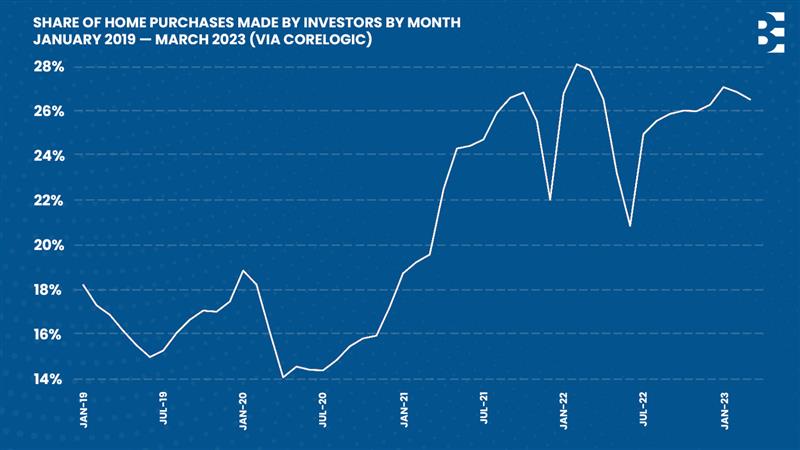Senate Democrats have put forth a new bill known as the Stop Predatory Investing Act.
The primary aim of the bill appears to be to target massive hedge fund behemoths, preventing them from exploiting tax benefits by owning significant amounts of real estate. Specifically, the bill would prohibit an investor owning 50 or more single-family rental homes from deducting interest or depreciation on those properties.
At first glance, it appears to have potential benefits for both real estate investors and homeowners. Those investing in 49 or fewer 1- to 4-unit properties will see no change. All the tax benefits appear to remain intact.
However, if you have scaled your business beyond that 49-property count, it appears as though all the tax benefits for providing housing would be stripped. This is intended to limit one entity's holdings, keeping more on the market for would-be homeowners and imaginably creating a weaker demand, bringing down the price of housing for the would-be homeowner. Given the provisions for specific exclusions, it is imperative to understand who that benefits and who it limits.
According to data reported by the PEW Trust and originally gathered by CoreLogic, as of 2022, investment companies own about one-fourth of all single-family homes. Further CoreLogic data shows that nearly half (49%) of investment properties purchased in Q3 of 2022 were made by small mom-and-pop investors — those with fewer than 10 properties. The other half was made up of medium-sized investors (11–100 properties) at 33%, large investors (101–1000) at 8%, and mega investors (more than 1000) at 11%.
While the bill’s supporters have recognized that small investors currently own a substantial share of rental housing, they have also highlighted the significant increase in purchases by institutional investors during the height of the pandemic.
The National Association of Realtors (NAR) has also reported that institutional buyers purchased 13.2% of homes sold in 2021 (up from 11.8% in 2020), accounting for as much as 28% purchased in Texas and 17% or more in Georgia, Oklahoma, Alabama, and Mississippi.
While acknowledging that large investors have taken advantage of housing opportunities by acquiring large blocks of homes, many are eager to delve deeper into the bill's specifics to fully understand its proposed parameters. It's not uncommon for such bills to contain exceptions that, upon closer inspection, appear to disproportionately benefit extremely large investors while limiting opportunities for smaller, local-scale businesses.
With “mega investors” owning such a small slice of the pie, it could be that they are not the precise target. Given the potential implications of the Stop Predatory Investing Act, it is crucial for anyone involved in or interested in real estate investment to closely scrutinize its contents. There could be — as is always potential for — some harsh unintended consequences with the passing of this.
Read the bill, understand the effects, ask questions, and make your voice heard by those pushing it. By staying informed and actively participating in the discussion, we can better shape the outcome of this proposed legislation and safeguard the interests of all stakeholders in the real estate market.
About the Author:
Aaron Chapman is a veteran in the finance industry with expertise in complex transactions since 1997. He is ranked in the top 1% of over 300,000 licensed loan originators and closes over 100 transactions per month. Learn more at aaronbchapman.com.
Disclaimer:
The views and opinions expressed in this blog post are provided for informational purposes only and should not be construed as an offer to buy or sell any securities or to make or consider any investment or course of action.
SecurityNational Mortgage Company, and its loan officers, unless individually licensed and specifically denoted in their credentials, are not qualified to, and are prohibited from representing themselves as accountants, attorneys, certified financial planners, estate planners, investment specialists, or tax experts, and will not advise you in those matters. Always seek the advice of a licensed professional. This article is for informational purposes only, contains the opinion of the author, not necessarily the opinion of SecurityNational Mortgage Company, and should not be construed as lending advice. Loans are subject to borrower qualifications, including income, property evaluation, sufficient equity in the home to meet LTV requirements and final credit approval. Approvals are subject to underwriting guidelines, interest rates, and program guidelines, and are subject to change without notice based on applicant’s eligibility and market conditions. Refinancing an existing loan may result in total finance charges being higher over life of loan. Reduction in payments may reflect longer loan term. Terms of the loan may be subject to payment of points and fees by the applicant. Aaron Chapman, NMLS#267844, SecurityNational Mortgage Company Inc., Co. NMLS# 3116, AZ Banker# 0904315, Equal Housing Lender. Any amounts, figures, payments, or loan terms stated are based on continually changing markets, rates, loan programs, and borrower-specific qualifications, and subject to change without notice. See loan officers featured for a personal consultation and accurate pricing.
The opinions expressed in this article are the opinions of Aaron Chapman. Such are not the opinions of SecurityNational Mortgage, is informational in purpose, and should not be construed as lending advice.




